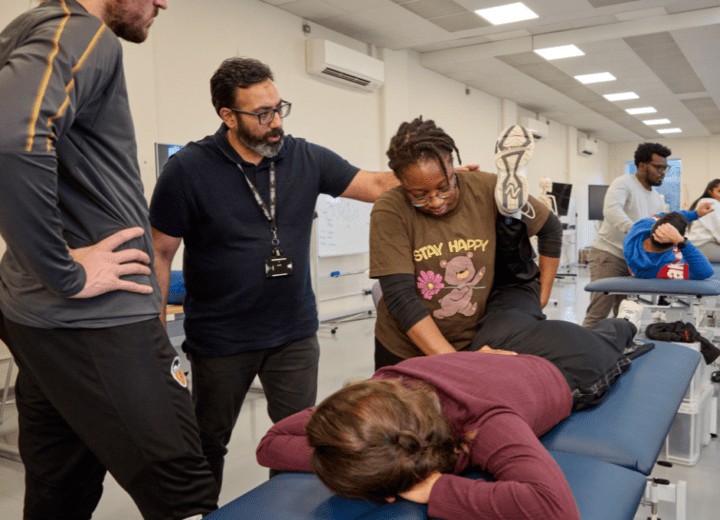5 things to know about working as a Physiotherapist

Considering studying for a physiotherapy degree? It’s a dynamic, challenging, and fulfilling field. Senior Lecturers at London Met, Walaa Abu-Taleb and Isobel Davies, share their career experiences and offer advice for future physiotherapy students.
- Physiotherapy covers all aspects of healthcare – not just sport.
Being a physiotherapist means helping people recover from injuries and illnesses to improve their quality of life. The role is diverse, working in an inpatient setting may involve working in departments such as stroke recovery, Intensive Care Unit (ICU), Accident and Emergency (A&E), orthopaedics or cancer care. An outpatient setting could involve working in fracture clinics, musculoskeletal clinics or private settings like professional sports clubs.
Ideal candidates are empathetic, compassionate and enjoy helping others. They’ll have the drive to help people improve their health and overall lifestyle, have good communication skills and don’t mind helping with daily tasks.
- You’ll get to know your patients, build a rapport and tailor their treatment to their specific needs.
The job is rewarding and involves seeing people progress from their lowest moments. It is common for patients in intensive care to have lost all their strength and be unable to even sit up independently. A physiotherapist will help them back to normal function.
“One of my favourite memories is of a patient who I cared for in the ICU for six months during the pandemic. One of her personal goals was to be able to stand and make a cup of tea, at the end of her ICU stay we threw a tea party for the ward, and she ended up making 15 cups of tea for other patients and staff. We played her favourite music and it was such a joyful moment during what had been a really challenging time.” – Isobel
“Relieving a patient’s pain, improving their quality of life and hearing gratitude from them and their loved ones is priceless in my career. Hearing them express simple pleasures such as getting a good night’s sleep or being able to pick up their children and cuddle them is very satisfying.” – Walaa
- The hours you work can vary to provide the best care for patients.
The hours you work as a physiotherapist will depend on the setting. It can involve shift work including weekends and overnight shifts.
“The hospitals I worked at provided an 8 am – 6 pm daily physiotherapy service seven days a week. I would do a pattern of early shifts 8 am – 4 pm, or late shifts 9 am – 6 pm five days a week with a weekend shift once a month. Once a month, we would be required to complete an on-call shift to ensure there was a Physiotherapist available for emergency treatment, which required us to stay at the hospital and be available during the night at short notice.” – Isobel
- Being a Physiotherapist can be challenging and emotionally demanding but witnessing the positive on peoples’ lives is priceless.
In this role you are often dealing with patients at their lowest point, whether physically or mentally, and occasionally patients pass away.
“It’s something that is never easy but with the right training and tools you can learn to manage it. Debriefing, reflecting and sharing your feelings with colleagues can be really valuable.” – Isobel
Being a physiotherapist isn’t easy but worth the reward. During busy times, you’ll need to keep up to date with the latest research and evidence-based practices and some admin. However, the positive impact you have on peoples’ lives is incredibly rewarding.
- You can specialise in an area you find interesting.
Some examples of specialist physiotherapy areas are:
- Musculoskeletal
- Neurological
- Cardiorespiratory
- Sports rehabilitation and injury prevention
- Women’s Health
- Paediatrics
Walaa is a specialised Musculoskeletal Physiotherapist. This involves assessing and treating conditions including acute and chronic injuries, pre and post-surgical rehabilitation, post-injuries rehabilitation, sports injuries and age-related musculoskeletal issues.
“My role involves performing risk assessment, assessing and diagnosing patients, organising each case according to urgency, developing individualised treatment plans, providing patient education, hands-on therapy and tailored exercise prescriptions.” – Walaa
If you are considering studying Physiotherapy, do it!
Physiotherapy is a rewarding career with plenty of room to specialise in what excites you. Keep an open mind during your studies – you might surprise yourself, like really enjoying neurology on placement. You’ll also be ready to hit the ground running in your career at the end of it by gaining experience in different settings, from hospitals to sports and private clinics.
Want to know more? Discover Physiotherapy BSc at London Met.
